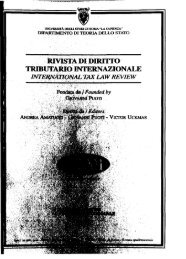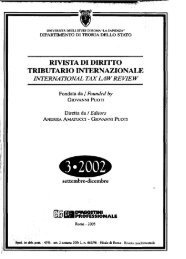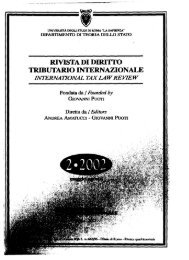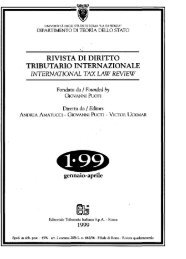RIVISTA DI DIRITTO TRIBUTARIO INTERNAZIONALE - Rdti.it
RIVISTA DI DIRITTO TRIBUTARIO INTERNAZIONALE - Rdti.it
RIVISTA DI DIRITTO TRIBUTARIO INTERNAZIONALE - Rdti.it
You also want an ePaper? Increase the reach of your titles
YUMPU automatically turns print PDFs into web optimized ePapers that Google loves.
Sezione l - Dottrina<br />
cesso Operators strongly opposed this aspect, considered to be overly penalising<br />
(28).<br />
e) Tenns for opting into the regime<br />
Countries that have adopted the system of lump-sum deterrnination<br />
of the taxable basis have set down terrns for exercising the option: a<br />
year in the Un<strong>it</strong>ed Kingdom and in the Netherlands and three years in<br />
Gerrnany (for ships already enrolled in the national register). In Norway<br />
there is no obligation, as in Greece where, however, the system is<br />
compulsory.<br />
o The period of irrevocabil<strong>it</strong>y of the option<br />
The Italian proposal requires that the election to the regime is irrevocable<br />
for "a minimum period of five years". All European countries that<br />
have introduced tonnage tax have a similar provision, w<strong>it</strong>h the exception<br />
of Greece, on the account of <strong>it</strong>s compulsoriness, and Norway. The election<br />
period is generally of ten years. Also Spain, the latest country to introduce<br />
tonnage tax, has adopted the ten year limi t.<br />
g) Ancillary and related activ<strong>it</strong>ies<br />
The defin<strong>it</strong>ion of the ancillary and related mar<strong>it</strong>ime transport activ<strong>it</strong>ies<br />
qualifying for the lump-sum taxation regime is indeed a delicate<br />
aspect, laden w<strong>it</strong>h implications in terrns of overall effectiveness of the<br />
measure.<br />
As we have seen, the Bill provides that the new regime "might also"<br />
include income " ... from complementary or ancillary commerciai activ<strong>it</strong>ies".<br />
This choice is in line w<strong>it</strong>h what already done in other countries<br />
which preceded Italy in the introduction of the tonnage tax. The Netherlands,<br />
the Un<strong>it</strong>ed Kingdom and Gerrnany have included, though to a different<br />
extent and w<strong>it</strong>h varying degrees of flexibil<strong>it</strong>y, income from management<br />
activ<strong>it</strong>ies, leasing, loading and unloading of cargo, catering and<br />
auxiliary services. Norrnally, their inclusion is made cond<strong>it</strong>ional upon the<br />
fact that the activ<strong>it</strong>ies are actually complementary to the main activ<strong>it</strong>y<br />
(which must remain mar<strong>it</strong>i me transport) and, that the provision of services<br />
be mainly on ships that make up the shipowner's fleet.<br />
In the Netherlands and in the Un<strong>it</strong>ed Kingdom, as earlier mentioned,<br />
an objective cr<strong>it</strong>eria to identify the extent to which complementary and<br />
ancillary activ<strong>it</strong>ies can be carri ed out on not owned tonnage has been in-<br />
(28) Though this be the case. the "all in all out" provision seerns to appeal to other<br />
countries which have onI)' just introduced tonnage tax, see for instance Spain.<br />
<strong>RIVISTA</strong> <strong>DI</strong> <strong>DI</strong>RITID TRIBIJTARIO <strong>INTERNAZIONALE</strong> 312001<br />
,-<br />
: 9 4<br />
'---






